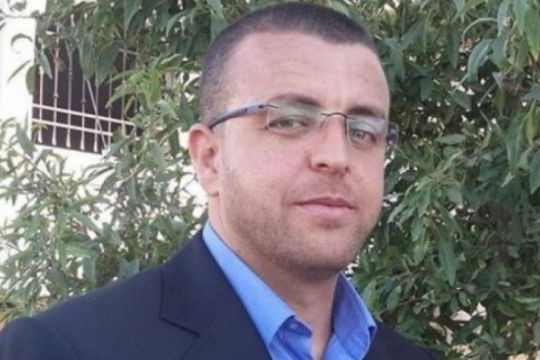Palestinian reporter Muhammad al-Qiq has been on hunger strike for some 70 days in protest of his administrative detention — a tool Israeli authorities use to imprison people without charge or trial. Ethics committee considers treating him against his will.
By Yael Marom and Noam Rotem

The medical ethics committee at Emek Medical Center reportedly met on Thursday to discuss forcefully administering medical treatment to hunger striking Palestinian journalist Muhammad al-Qiq. Israel passed a law last summer allowing the force-feeding of hunger striking prisoners under some conditions, something that directly contradicts established medical ethics and international conventions. It has never been used.
Doctors at the Emek Medical Center reportedly sent two medical updates within the span of a few hours to the Supreme Court on Tuesday about the deterioration of Palestinian al-Qiq, who has been on hunger strike for some 70 days in protest of his administrative detention. In its ruling denying al-Qiq’s release last week, the Supeme Court said it would follow his health on a daily basis. The panel of three justices said that if his condition worsened, the State would need to revisit its position.
The journalist’s attorneys argued against him being held in administrative detention at all, but also that due to his medical state he could no longer be considered dangerous.
Israel uses administrative detention to imprison Palestinians, and sometimes Jews, without charge or trial. Administrative detention orders are generally for six months but can be renewed indefinitely. The only way administrative detainees can challenge their detention, aside from court challenges that almost always fail, is to go on hunger strike.
A number of Palestinians have won their release from Israeli administrative detention in recent years after lengthy hunger strike. Many have nearly died.

One of al-Qiq’s attorneys, Jawad Boulus, head of the legal department at the Palestinian Prisoners Club, said that according to the second medical report submitted to the court on Tuesday, the hunger striking journalist is in tremendous pain and it will soon be too late to give him any meaningful medical treatment. His attorney, who visited al-Qiq on Thursday, said he looks like a “skeleton.”
Against the recommendation of his doctors, al-Qiq is reportedly refusing all medical treatment and tests and is not taking any dietary supplements. Earlier this week, al-Qiq’s attorneys reported that he had lost his ability to hear and 60 percent of his sight.
Al-Qiq, 33, from the West Bank village of Dura near Hebron, worked as a reporter for the Saudi news channel “Almajd.” He was arrested on the night of November 21, 2015 when Israeli soldiers arrested him at his home. He was not allowed to make contact with either his wife or his attorney for many days.
Al-Qiq began his hunger strike four days after the beginning of his interrogation, when the latter reportedly understood that his interrogation was politically motivated. Sources close to Al-Qiq state that he was interrogated for “journalistic incitement,” and when he refused to cooperate, he was put in administrative detention for a period of six months.
The Shin Bet claims he is a member of Hamas who was previously jailed several times due to his activities in the organization. His current detention, according to the Shin Bet, came following “founded suspicions of involvement in terror activities with Hamas.”
He has not been charge with committing a crime. His attorneys are not allowed to see the evidence being used to justify his continued administrative detention.
Israel is currently imprisoning without charge or trial hundreds of Palestinians and at least one Jewish Israeli. The authority to issue administrative detention orders is drawn from pre-state colonial laws that are only valid as long as Israel is officially in a state of emergency, which it has been continuously since its establishment in 1948.


